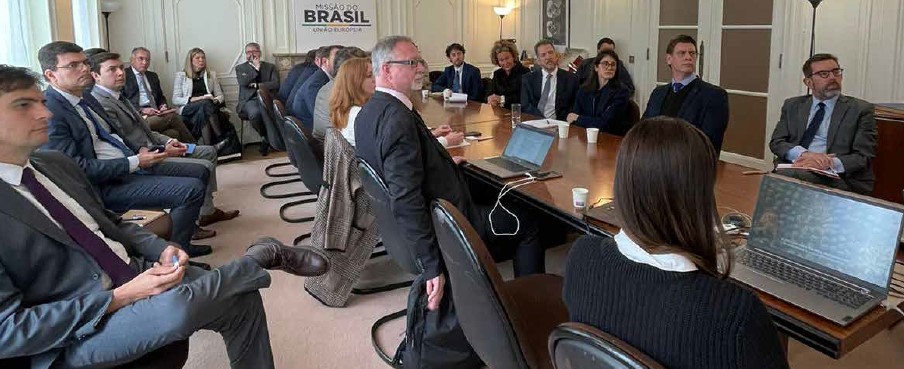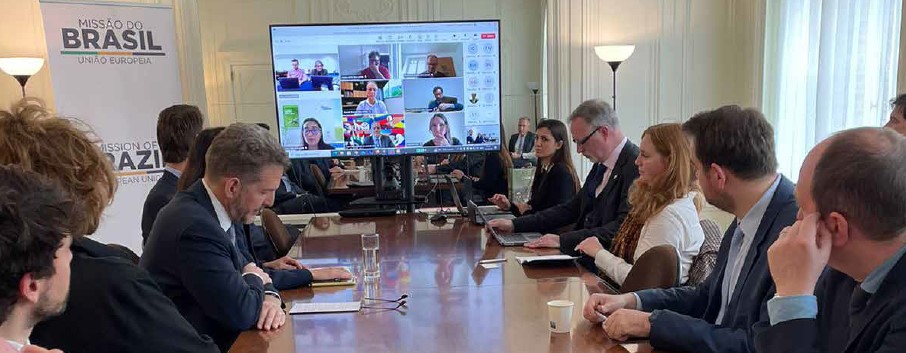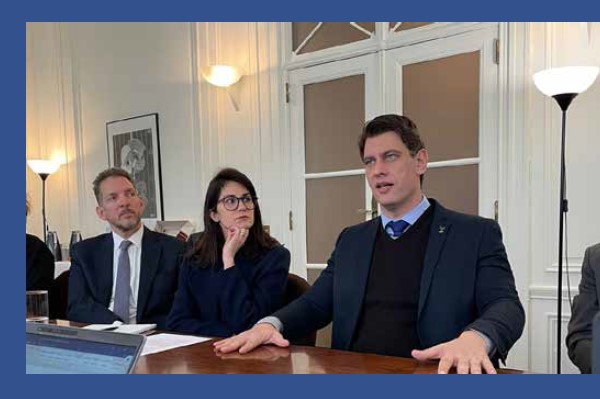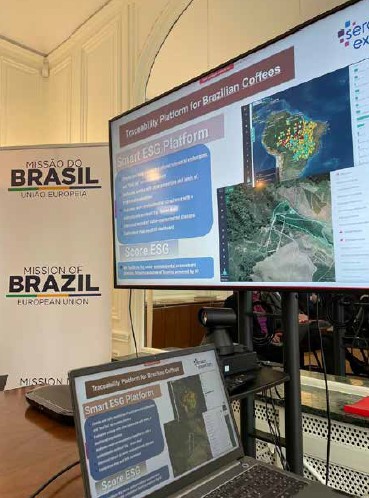In Brussels, an event organized by the Brazilian Mission to the EU, in partnership with Cecafé, opens up the possibility of Brazilian coffees being recognized as EUDR compliant

The presentation of the proven sustainability of Brazilian coffees and the existence of a tool to help importers certify this socio-environmental and economic respect for the activity in the country is becoming increasingly necessary as the European Union Regulation for Deforestation Free Products (EUDR) comes into force.
And this is exactly what the Brazilian Coffee Exporters Council (Cecafé) has been working on since April 2023, when the European Parliament approved the law, which will enter into force on January 1, 2025.
The most recent initiatives we carried out were in Brussels (BEL), the seat of the European Parliament, between April 22 and 26, to defend the sustainability of Brazilian coffee and its compliance with the EUDR.
The action with the greatest impact was carried out in partnership with the Brazilian Mission to the EU, when we presented the “Brazilian Coffees Socio-Environmental Monitoring Platform”, developed by Serasa Experian in partnership with Cecafé, to the political authorities of the bloc.
For the first time in history, an event coordinated by the Brazilian Mission in partnership with a private entity managed to bring together high-level decision-makers from the four main areas of the European Commission, such as the Directorates General (DGs) for Environment, Agriculture and Rural Development, International Partnerships and Trade, as well as envoys from the European Parliament, the European Space Agency (EUSPA), the Joint Research Center (JRC) and, above all, the authorities responsible for monitoring the EUDR in Germany, Belgium, Italy, Spain, Sweden, Ireland and Slovenia.
On the occasion, we explained to these authorities the technical details, geolocation and socioenvironmental data collection of the platform. We are asking for the EUDR rules to be more detailed and for the fines to be reduced for a period of one to three years so that the least prepared countries can adapt to the rule.


We also ask for the recognition of Brazilian information systems and the respect of the laws of the countries of origin, such as the Forest Code and the constitutional rights related to land use in Brazil.
After our explanation, the representative of the European Commission’s Directorate General for the Environment, Emanuele Pitto, praised the socio-environmental compliance formats of the Brazilian Coffees platform and invited Cecafé to make a presentation and participate in the debates of the EUDR multi-stakeholder platform.
This is crucial because this forum analyzes the tests of the new system that the Europeans have for control and, above all, because we can make our contributions in an environment that, until now, has been limited to the countries of the continent and a few previously selected global companies.
The Secretaries General of the European Coffee Federation (ECF) and the Swiss Coffee Trade Association (SCTA), Eileen Gordon and Krisztina Szalai, respectively, praised Cecafé’s work as a representative of Brazilian coffee at a critical level of the debate on the EUDR.
They highlighted the fact that we maintain synergies with international partners, that we respond vigorously to concrete questions about challenges, and that we present in a creative way the constant progress of Brazilian coffee, based on decades of investment in research, technology and innovation, among which they included, as the most recent item, the Cecafé-Serasa Experian Platform.
The representatives of the Directorates-General for Agriculture and Rural Development and International Partnerships commented positively on the information and methodology for evaluating the Brazilian Forest Code, the Rural Environmental Registry (CAR) and the entire alert system included in the platform presented.
They confirmed the challenges of the EUDR and left open the possibility of flexibility and possible changes. We know that the new European Parliament will take office in September, but there’s nothing to stop meetings being brought forward so that we can continue the debates after they take office.
Through our actions, it was also possible for Brazil to open doors for dialogue with the authorities responsible for monitoring the EUDR in each country of the bloc, especially with Germany, Belgium, Italy, Spain, Sweden, Ireland and Slovenia, who were present at our meeting.
This rapprochement was made possible after the Serasa Experian team raised questions about the JRC forest cover map and demonstrated, technically and factually, that the use of this tool will have a negative and undue impact on production origins.

The use of the JRC map will be a quicker and easier way, but it is terrible in terms of deforestation alerts, in areas where coffee has been consolidated for decades, and this has been very well substantiated, in a technical way, by Serasa Experian.
As a counterbalance to not using the JRC map, we suggested that the countries of origin of the food affected by the EUDR could provide their own mapping, with greater accuracy, as in the
example of the Cecafé-Serasa Experian platform in Brazil. In addition, the way is open for a dialogue focused on each competent authority to arrive at the best alternatives.
As an extension of our meeting, on the 26th we concluded our agenda in Brussels at the main building of the European Parliament, where I met with representatives of all the committees to network and open dialogues on the acceptance of the Cafés do Brasil Socio-Environmental Monitoring Platform as an official tool in compliance with the EUDR.
It was an intense, proactive and extremely positive agenda for the Brazilian coffee sector, which took its image of socio-economic and environmental responsibility to a new level, leaving the national diplomatic corps very satisfied, in the words of our Ambassador to the EU, Pedro Miguel Da Costa e Silva, whom we thank, as well as the entire diplomatic corps, for their receptiveness and for all their services in these initiatives.
By participating in the most important national and global forums, proactively demonstrating the sustainability of Brazilian coffee around the world, especially in our main importing partners, as well as providing programs and projects that allow access to socio-environmental monitoring technologies, promoting scientific studies and training, the coffee exporting segment, represented by Cecafé, is acting efficiently and diligently to integrate more and more ESG practices in the supply chain.
Marcos Matos
CECAFÉ CEO



Leave A Comment